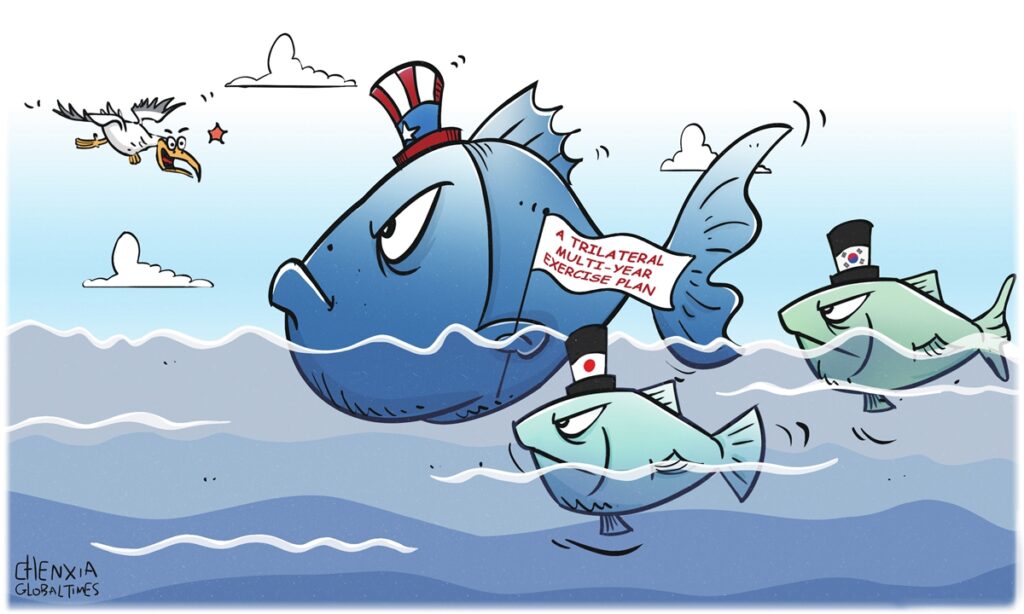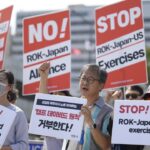The military cooperation between the US, Japan, and South Korea is moving toward a military alliance, which not only intensifies tension on the Korean Peninsula and confrontation in Northeast Asia, but also complicates and intensifies the situation in the Indo-Pacific region, seriously affecting regional peace and stability.
According to a report by Yonhap News Agency, the US, Japan, and South Korea have agreed to develop a multi-year trilateral exercise plan within this year and implement “more systematically and efficiently” joint exercises from January next year. During the meeting, the defense ministers of the three countries also agreed to start a real-time data sharing scheme on North Korean missiles in December as planned. The purpose of this meeting is to discuss the follow-up measures of the Camp David Summit held in August this year.
The military cooperation among the US, Japan and South Korea has reached an institutionalized and normalized stage, and this cooperation will continue to deepen. If the trilateral military alliance between the US, Japan, and South Korea is truly established, it will pose a huge threat to peace and stability in Northeast Asia and even the Indo-Pacific region, experts warned.
Zhan Debin, director and professor of the Center for Korean Peninsula Studies at the Shanghai University of International Business and Economics, told the Global Times that the development of the “multi-year trilateral exercise plan” agreed upon by the defense ministers of the US, Japan, and South Korea will intensify tension in Northeast Asia. If tension in Northeast Asia escalates, the most affected country will be South Korea, hence South Korea should have a clear understanding of the impact of regional developments on its own country.
The US has long hoped to merge the US-Japan alliance and the US-South Korea alliance into the US-Japan-South Korea alliance. This goal is being continuously advanced through institutionalization of trilateral cooperation, which has almost sounded the trumpet of a “new cold war” in Northeast Asia, raising the banner of group confrontation.
Under US’ coercion and temptation, Japan and South Korea have become the vanguards of a “new cold war” against China. The US-Japan-South Korea security cooperation could accelerate the NATO-ization of the Asia-Pacific region, which will not only have a significant negative impact on the security environment around China, but also on the cooperation process in East Asia. This deepening of US-Japan-South Korea military cooperation seriously disrupts the military balance in the region and may even lead to a new round of regional arms races.
Worryingly, military cooperation model between the US, Japan, and South Korea is expanding. Recently, the joint military training exercises between the Philippine Marine Corps and US Marine Corps saw the formal participation of Japan and South Korea for the first time. Zhan believes that the frequency of US-Japan-South Korea cooperation in the South China Sea is increasing, and the US intends to develop an “Asian version of NATO” based on this.
Such trilateral cooperation is impossible to put other countries in the region at ease. Many have shown concerns over the worrying trend. It is in fact also dangerous for Japan and South Korea. Both the two are located in Northeast Asia and have already deeply integrated with the security and prosperity of this region. Turning Northeast Asia into a front line of camp confrontation is nothing but inviting disaster.
(Global Times)




